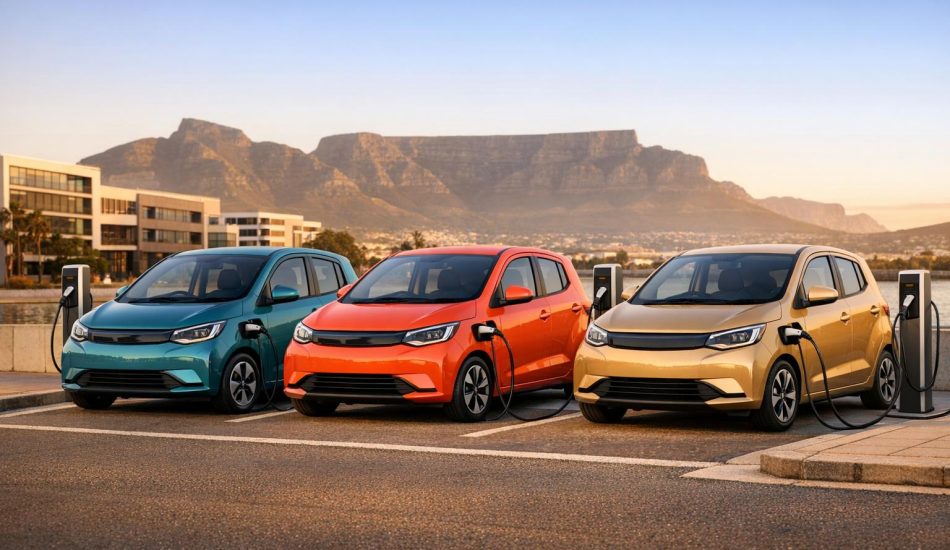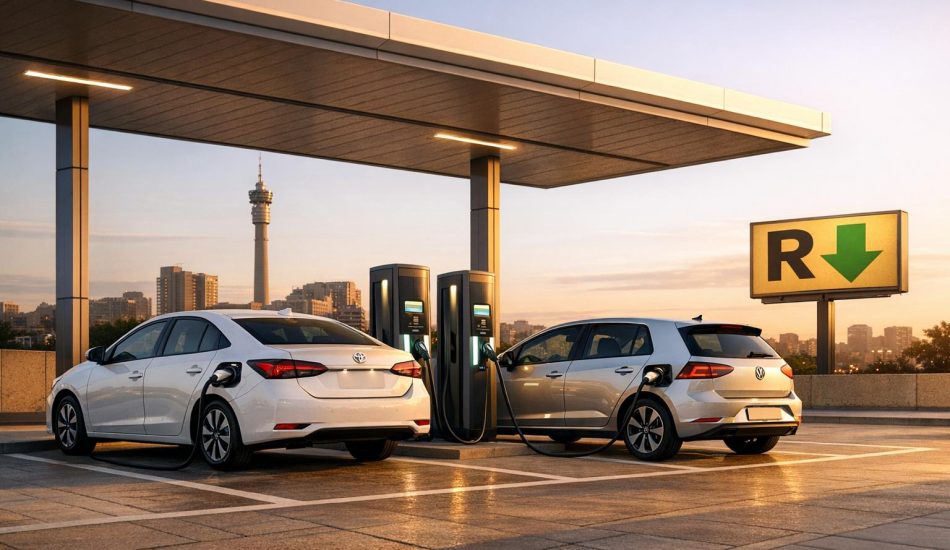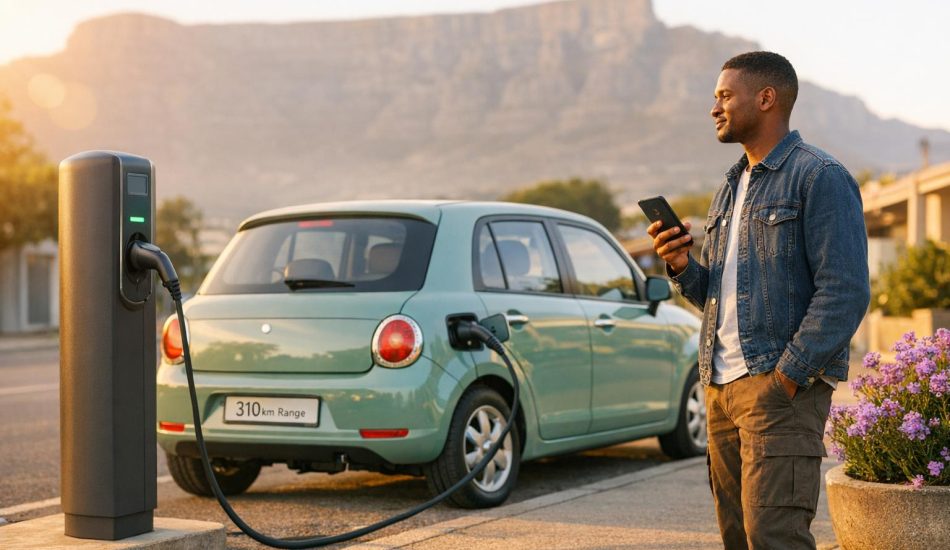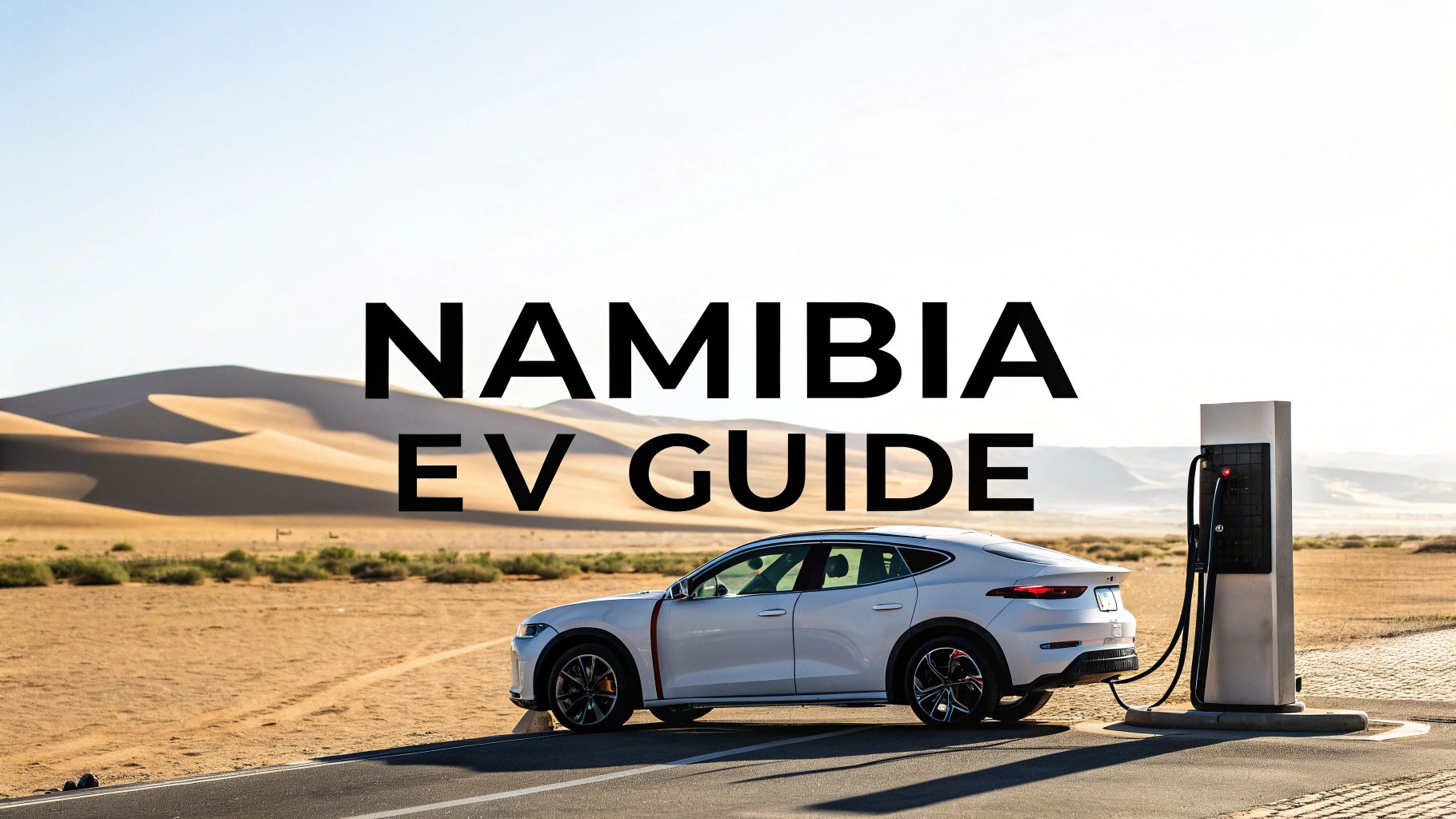
Finding a trustworthy electric car dealer in Namibia used to be a real mission, but things are definitely looking up. As the market expands, specialists like EV24.africa are stepping in to connect Namibians with major brands like Tesla and BYD.
These guys handle the whole nine yards – from finding the right car abroad to dealing with customs and getting it to your driveway. It’s making the jump to electric a whole lot less daunting.
Understanding Namibia's EV Market Today
The electric vehicle scene here is buzzing. It's no longer just a fringe interest for the eco-conscious; it's becoming a practical choice for many. With fuel prices constantly on the rise and a growing desire for greener living, Namibians are giving EVs a serious look for everything from the school run to business use.
Not too long ago, if you wanted an EV, you were pretty much on your own, trying to figure out a messy import process. Thankfully, that's changing. A new wave of specialised importers has emerged, and they know the cars and, just as importantly, they know Namibian logistics.
Key Drivers Shaping the Market
So, what's fuelling this change? A few things, really.
- It Just Makes Cents: Let's be honest, the ever-increasing cost of petrol and diesel stings. The low running cost of an EV is a massive draw. Charging your car at home is dramatically cheaper than a weekly trip to the filling station.
- A Greener Outlook: People are more aware of their environmental impact. Choosing an EV is a tangible way for individuals and businesses to lower their carbon footprint and contribute to cleaner air.
- More Cars to Choose From: We're finally seeing a better variety of electric models that can handle Namibian roads, from zippy city cars to tough, family-sized SUVs.
The Major Players and How They Operate
The biggest shift has been the improved access to top international brands. You can now find models from Tesla, Nissan, BYD, Hyundai, and Volkswagen through either established dealers dipping their toes in the EV market or specialised import facilitators.
Companies like EV24.africa are at the forefront, taking the headache out of the process. They manage the sourcing, shipping, customs clearance, and final delivery, making it a smooth, end-to-end service.
This managed approach is a game-changer. You're no longer left guessing about international shipping rules or surprise tax bills. A good facilitator gives you a clear, all-in price, making the experience feel just as simple as walking into a local showroom. You can see exactly how EV24.africa is leading Namibia's EV revolution to get a better idea of how it all works.
How to Identify Reputable EV Dealers and Importers
Finding the right partner for your EV purchase is probably the single most important step you'll take. Because the market here is still so new, you can't just rely on a list of official showrooms. You need to be a bit of a detective, knowing where to look and what to ask to sort the real experts from the risky operators.
Your search for the best electric car dealers Namibia has to offer needs to be more than just a quick Google search. A professional-looking website is a good start, but the real story is in their process, their transparency, and their reputation. You’ll quickly find the market is a mix of different players.
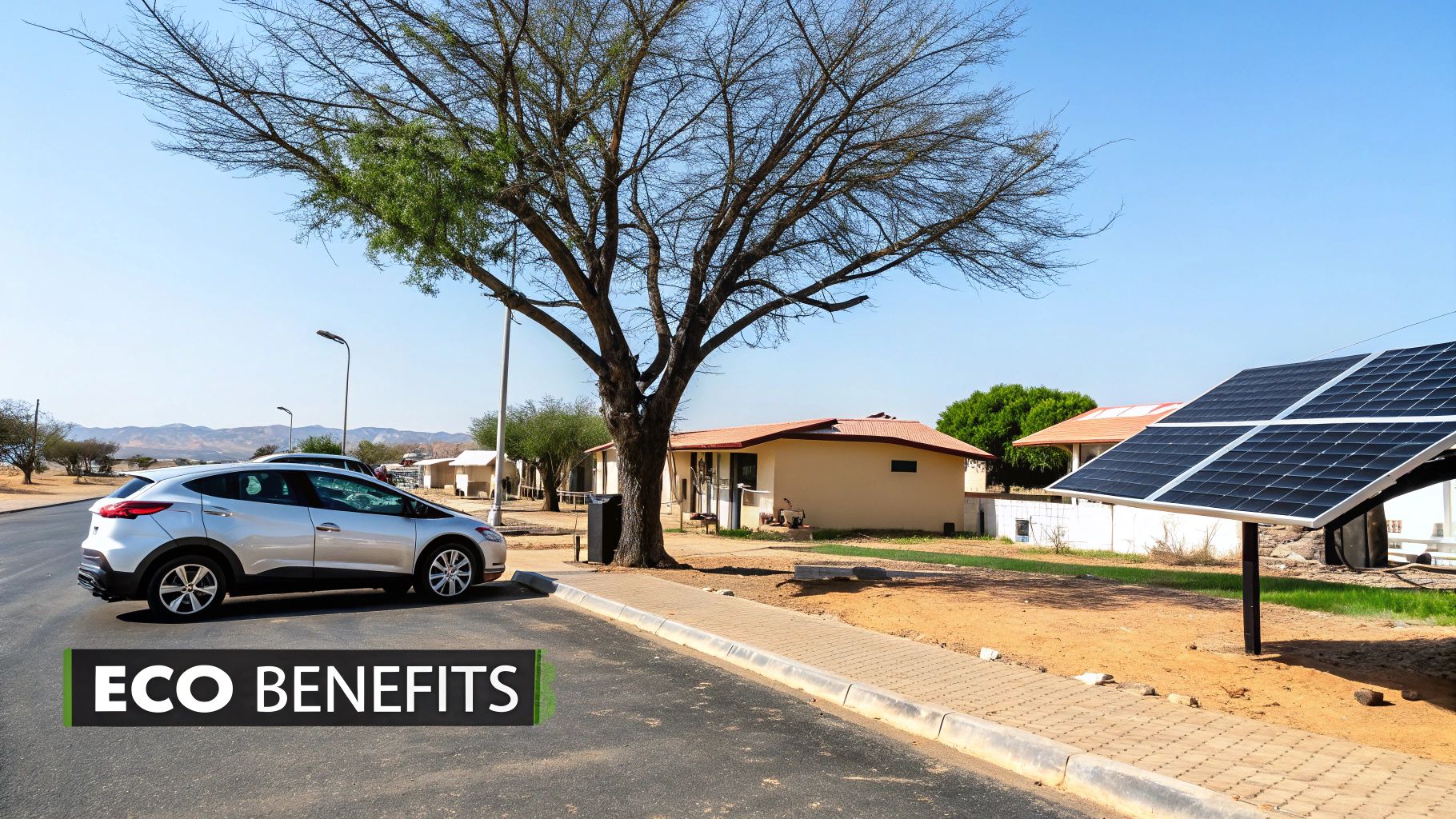
Generally, you'll run into three types of sellers:
- Official Dealerships: These are your traditional car dealers who are just starting to add EVs to their inventory.
- Independent Importers: Small businesses that specialise in sourcing and bringing in vehicles from places like the UK, Japan, or South Africa.
- Specialised Facilitators: Think of companies like EV24.africa. They offer a complete, hands-off service, handling everything from sourcing the car to delivering it to your door.
Vetting Your Potential Partners
Once you've got a shortlist, it's time to do your homework. A slick website doesn’t mean you’ll get a smooth, hassle-free experience. The goal is to find someone who is open, honest, and can actually prove they know what they're doing.
First, hunt for real customer feedback. Don't just rely on the glowing testimonials on their own site. Look up their business name on Facebook, check out local Namibian forums, and see what actual people are saying. Are the stories positive and detailed? That’s what you want to see.
Beyond their physical presence, a good dealer invests in effective online reputation management. If they’re actively responding to reviews and engaging with customers online, it’s a strong sign they genuinely care about keeping people happy.
Key Questions to Ask Any Dealer
Don't hold back here. A trustworthy dealer will appreciate your thoroughness and have ready answers. If they get defensive, vague, or can't give you straight answers, that's a massive red flag.
Here are the absolute must-ask questions for your list:
- Can you explain the import process from start to finish? They should be able to clearly outline how they manage shipping, customs duties, and the crucial NRCS certification. Insist on an itemised breakdown of all costs.
- What's the story with the warranty and after-sales support? This is non-negotiable, especially for an import. Is it a manufacturer's warranty valid in Namibia? Or is it a third-party policy? Critically, who do you call when something goes wrong?
- Can you show me proof of previous imports? Ask for references or photos of similar cars they've already brought into Namibia for other clients. A proven track record is everything.
A tell-tale sign of a reliable partner is their willingness to provide a single "landed cost." This is an all-inclusive price that covers the car, shipping, taxes, and every last import fee. It protects you from nasty surprises down the line.
At the end of the day, this is about finding someone you can trust with a significant purchase. To get a clear idea of what a professional, secure import service should look like, you can see how the process works when you get your electric vehicle delivered by EV24.africa. It provides a great benchmark to measure other dealers against.
Comparing EV Models and Dealer Support
You've got your shortlist of potential dealers. Good. Now the real fun begins: moving from who you'll buy from to what you'll buy. Picking an electric car in Namibia isn't just about comparing battery size and acceleration. It’s about finding a vehicle—and a support system—that can handle our unique environment.
Let's be honest, a car that’s perfect for a European city might not be the best fit for Namibia's climate or the long stretches of road between our towns. This is precisely where a good dealer proves their worth. They won't just sell you a car; they'll guide you to a model that has a proven track record right here at home.
The conversation in the showroom is where you really start to get a feel for both the vehicle and the quality of the person selling it.
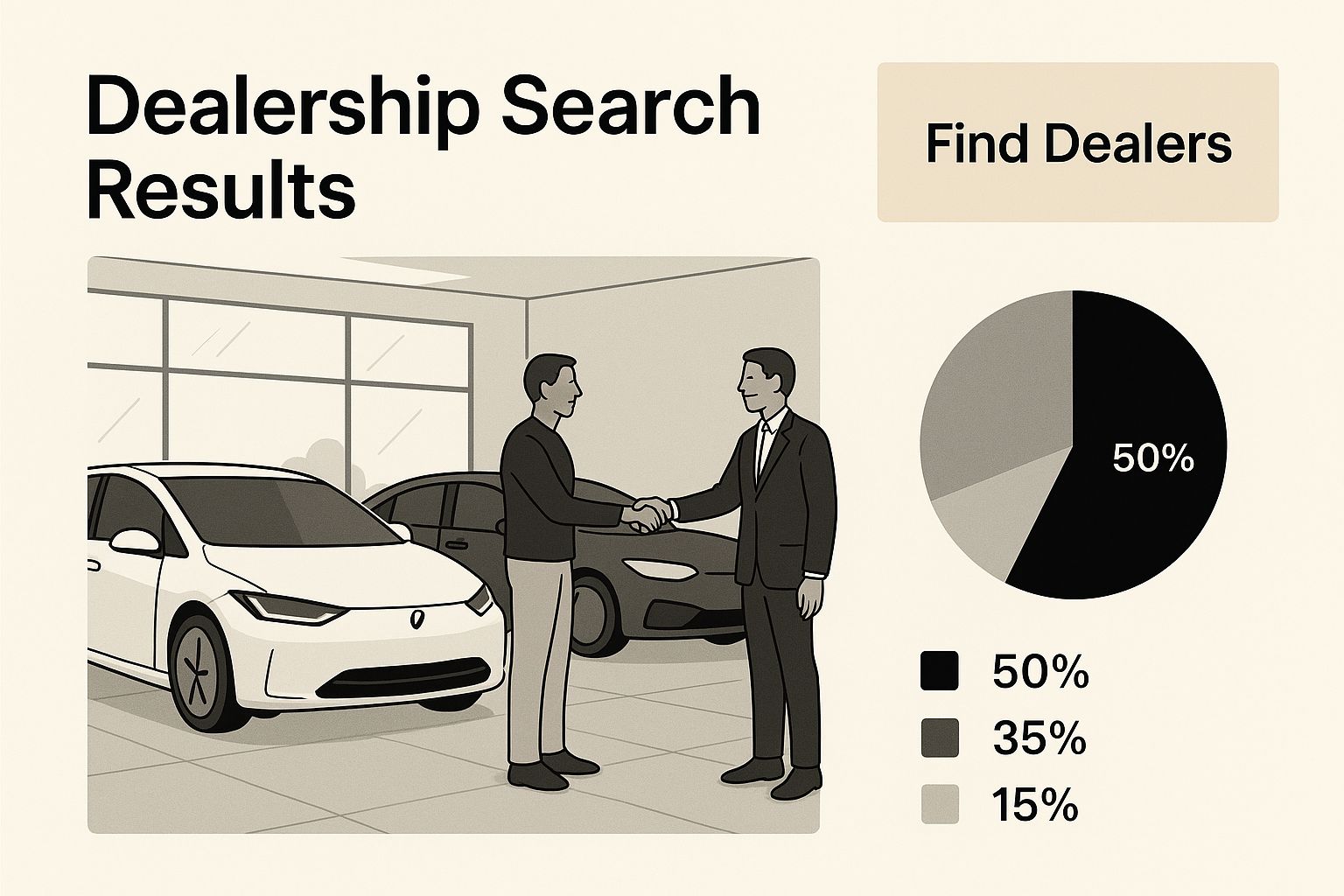
This step is critical. It’s where you shift from browsing online specs to seeing how the car and the dealer stack up in the real world.
Evaluating the Vehicle for Namibian Realities
A spec sheet gives you the numbers, but it doesn't tell the whole story. You need to ask questions that put the car squarely in a Namibian context. A dealer who can answer these questions without hesitation is a dealer who knows their stuff.
Here’s what to dig into:
- Real-World Range: Forget the official numbers for a moment. Ask for tested range figures in Namibian conditions. That factory WLTP range can easily drop by 15-20% in our summer heat, which makes a massive difference on a trip from Windhoek to Swakopmund.
- Home Charging Compatibility: Is the car’s onboard charger a match for Namibia's standard 220V single-phase power supply? What charging equipment actually comes with the car, and what else will you need to have installed? Get specific answers.
- Battery Cooling Systems: This one is non-negotiable. Ask if the vehicle uses an active liquid-cooling system for its battery. In our climate, this is essential for protecting the battery's health and ensuring you get the performance you paid for.
To give you a clearer picture of what's out there, I've put together a quick comparison of some popular models you're likely to find at Namibian dealerships. This should help you see how different vehicles stack up in terms of range, cost, and typical use.
Popular EV Models in Namibia at a Glance
| EV Model | Estimated Range (km) | Starting Price (N$) | Typical Down Payment | Example Use Case |
|---|---|---|---|---|
| GWM Ora 03 | 310 – 420 | N$ 600,000 | 10-15% | Perfect for city driving in Windhoek, daily commutes, and school runs. |
| Nissan Leaf | 270 – 385 | N$ 550,000 | 10% | A reliable and affordable option for town-based life, with a proven track record. |
| BYD Atto 3 | 420 | N$ 750,000 | 15% | Great for those needing a bit more range for weekend trips to nearby towns. |
| BMW iX3 | 460 | N$ 1,300,000 | 20% | A premium option capable of comfortable long-distance travel across the country. |
This table is just a starting point, of course. Prices and financing will vary between dealers, but it gives you a solid baseline for what to expect as you start your test drives.
Assessing After-Sales Support and Warranties
An EV is a big investment, so the support you get after the sale is just as important as the car itself. With imported vehicles, warranties and servicing can get complicated. A reputable dealer will have this all figured out.
Don’t settle for a vague promise of "we'll take care of you." A serious dealer will have a concrete plan. They can tell you exactly who does the repairs, where the parts come from, and what their warranty actually covers here in Namibia.
When you're talking about support, you need to be direct.
- Warranty Clarity: Is the manufacturer’s warranty valid in Namibia? If it isn't, ask to see the third-party warranty the dealer provides. Get a physical copy and read the fine print.
- Spare Parts Logistics: How do they get spare parts? Do they keep common components in stock, or is everything ordered from overseas? Ask for a realistic timeline for getting something critical, like a battery sensor or a new charge port.
- Technician Training: Have their mechanics been specifically trained to work on the EV brands they sell? Fixing an electric car is a different ball game; it requires specialised skills and diagnostic tools.
A dealer who gives you clear, documented answers to these questions is one who has truly prepared for the local market. It’s a strong sign that you’re dealing with a professional who will be a reliable partner for your entire EV ownership journey.
Getting to Grips with the Namibian Car Market
Before you jump into buying an electric vehicle, it’s smart to get a feel for the bigger picture of the Namibian car market. For as long as most of us can remember, our roads have been ruled by a few familiar names. Just look around—you'll mostly see Japanese and German badges. This isn't an accident; it's built on decades of trust, proven reliability, and solid service networks.
This deep-rooted loyalty has a real knock-on effect when it comes to buying an EV. It shapes everything from what people think a new electric model will be worth in a few years to how quickly a mechanic can source a spare part. The best electric car dealers in Namibia are the ones who get this and have a plan for it.
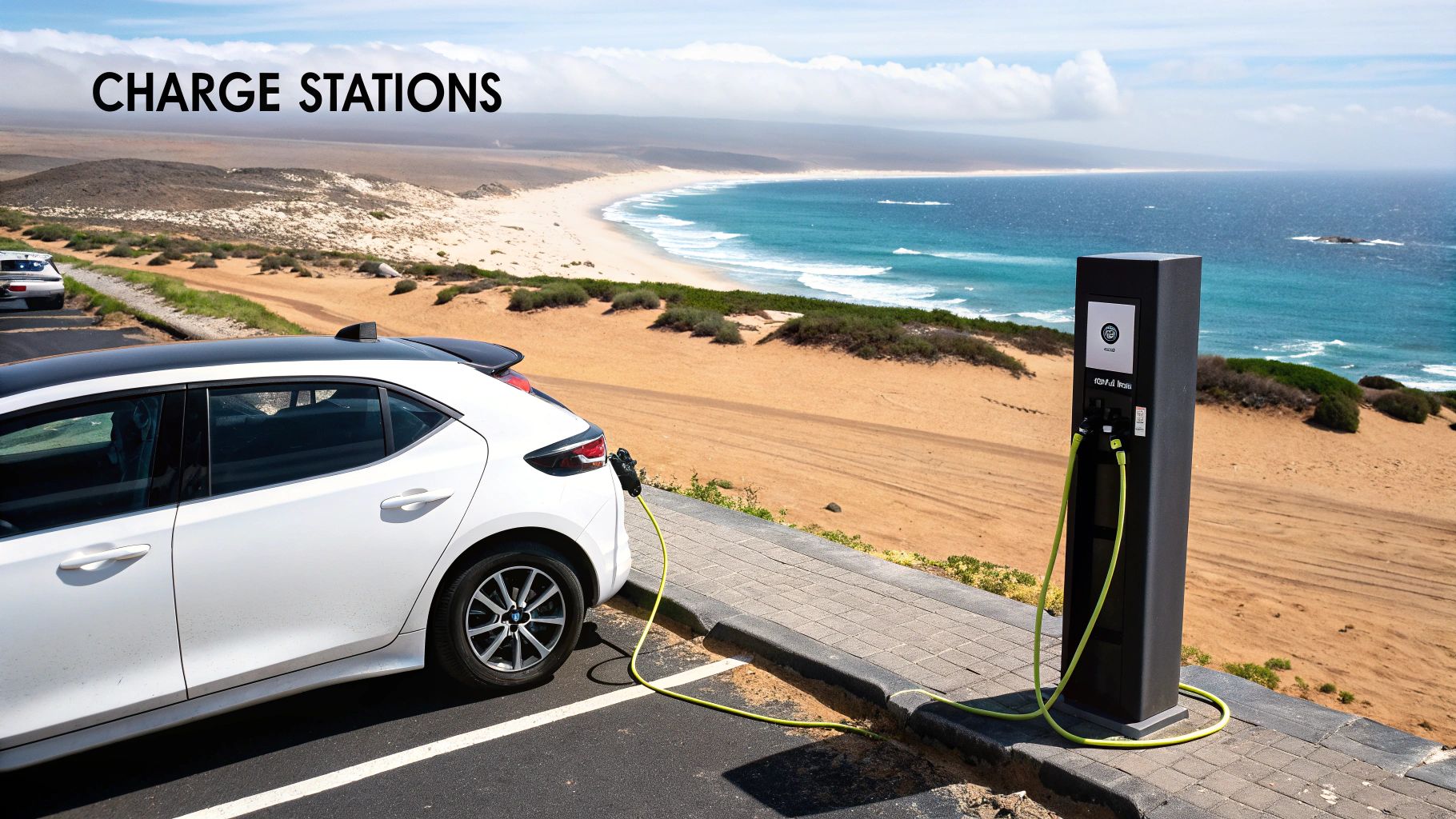
The Old Guard: Traditional Brands Still Rule
Go to nearly any workshop in the country, and the mechanics will know their way around a Toyota or a Volkswagen blindfolded. This deep familiarity gives the established brands a huge head start as they roll out their own EVs, like the VW ID.4. For many buyers, there's a real sense of security in that—a belief that the brand's reputation for quality will carry over to their electric cars.
But things are starting to change. The old guard is being challenged, and that’s creating some fantastic opportunities for anyone ready to look beyond the usual suspects.
The New Contenders: Affordable Chinese EVs are Shaking Things Up
There’s a major shift happening, and it's all about getting more for your money. While Japanese and German cars have long been the go-to, with Japanese brands making up 60% of all sales, there's a growing buzz around Chinese-made vehicles, especially in the EV space.
Why? It comes down to price. We're seeing a clear move towards more budget-friendly electric options from brands like Haval, Omoda, and BYD. This isn't just a small trend; it's a significant change in the market. You can read more about this shift and what Namibia can learn from it on Observer24.
What this means for you is simple: more choice. A German EV might come with brand prestige, but a Chinese model could deliver very similar tech and range for a much friendlier price tag.
A quick thought on value: It's tempting to think a well-known brand will hold its value better. While that might be true in the short term, the significantly lower running costs of a more affordable EV could easily save you more money over the life of the car.
Putting This Knowledge to Work
When you start talking to electric car dealers in Namibia, having this background helps you ask the right questions. You’re not just a tyre-kicker; you’re an informed buyer.
Here’s what to focus on:
- Spare Parts: Don’t be shy. Ask the dealer directly how they support a newer brand. Do they actually keep common parts in stock, or are you looking at a long wait for every little thing to be imported?
- Resale Value: Have an honest conversation about what to expect. A good dealer won't just tell you what you want to hear. They’ll give you a realistic idea of how a newer brand might depreciate compared to an established one.
- What’s Next? Ask if they’ve heard any whispers about future government incentives or tax breaks for EVs. Nothing is set in stone yet, but dealers with their ear to the ground might have some valuable insight into policies that could save you money down the line.
Thinking about these points takes you beyond simply buying a car. You're making a strategic decision that fits your life and the realities of the Namibian market. It’s this kind of forward-thinking that ensures the EV you choose isn't just fun to drive today but remains a practical, smart choice for years to come.
Getting Your EV to Namibia: Imports and Local Conversions
Let's be honest, you won't find many electric cars sitting on showroom floors in Namibia just yet. That means for most of us, importing is the name of the game. It sounds like a headache, but the right dealer makes all the difference. They act as your guide, handling the complicated bits so you don't have to.
Think of a good dealer as your project manager. They'll sort out the international shipping, tackle the mountain of customs paperwork at Walvis Bay, and make sure your new car gets all the right certifications. Your job is simple: provide the necessary documents and keep in touch. A trustworthy dealer will give you a single, all-inclusive price, so there are no nasty surprises when the car finally arrives. Just be prepared to wait a bit; the whole process usually takes several weeks from the moment you pay to the day you get the keys.
Breaking Down the Paperwork and Logistics
Getting a car here involves a lot more than just loading it onto a ship. The best electric car dealers in Namibia have built solid relationships with shipping companies and clearing agents. They know the system inside and out, which is exactly what you need for a stress-free experience.
Here’s a glimpse of what a good dealer handles behind the scenes:
- Sourcing and Inspection: They find the right car and double-check that it’s exactly as advertised.
- Shipping: They arrange secure transport from places like the UK, Japan, or South Africa right to our shores.
- Customs Clearance: This is where their expertise really shines. They handle all the import duties, taxes, and port fees.
- NRCS Certification: They ensure the vehicle meets all Namibian standards and is officially roadworthy.
The rules around vehicle imports can be a minefield. To get a better handle on it, check out our detailed guide on how to import an electric car under the new rules. It gives you a much deeper look into the entire process.
EV Conversions: A Truly Namibian Approach
Aside from importing, there's another really interesting option popping up locally: EV conversions. We're not talking about turning little run-around cars electric. This is a practical solution built for Namibia's most demanding industries, offering a completely different way to go electric.
This local ingenuity is a game-changer. Instead of waiting for manufacturers to build rugged EVs suited for our conditions, local specialists are creating them by retrofitting the vehicles we already trust. It’s a practical, powerful, and uniquely Namibian answer to the EV challenge.
Companies here are now taking iconic workhorses like the Toyota Land Cruiser and transforming them into fully electric 4x4s. These converted beasts are perfect for the harsh environments of mining sites, farms, and game lodges, where silent running and much lower fuel costs make a huge difference. This focus on retrofitting tough commercial vehicles fills a gap that most imported passenger EVs simply can't. It's proof that local innovation is really shaping our transport future. You can find more on how these conversions serve Namibia's key industries on GlobalMonitor.us.
Still Have Questions About Buying an EV in Namibia?
It's completely normal to have a few questions buzzing around your head before making the leap to electric. For most of us in Namibia, this is a brand-new world, and the practical side of owning an EV is quite different from what we're used to with petrol or diesel cars.
Let’s clear up some of the most common queries we hear. The idea is to give you honest, straightforward answers so you feel completely comfortable with your decision.
What’s the Real Story With Public Charging?
This is the big one, isn't it? And it’s a valid concern. Let's be frank: Namibia's public charging network is still growing. You’ll find chargers in Windhoek and a few other key spots like Swakopmund and along the B1, often at hotels, shopping centres, or service stations run by companies like Puma Energy.
But for your daily routine, you can't depend on them.
The best mindset for EV ownership in Namibia is to see your home as your primary fuel station. Seriously, the vast majority of your charging—easily over 90%—will happen overnight while you're asleep. Think of the public network as a handy bonus for a top-up when you're out, not your main energy source.
How Do I Handle Maintenance and Servicing?
Here’s where you'll be pleasantly surprised. EVs are mechanically simple. There's no oil to change, no spark plugs, no filters, and no clunky exhaust system to fail. That translates directly to much, much lower routine maintenance bills.
For servicing, you'll mostly focus on the things every car needs, but with a few twists:
- Tyres: The instant power from an electric motor can be a bit harder on tyres, so you might find they wear a little faster.
- Brakes: Your brake pads will likely last far longer. This is thanks to regenerative braking, where the motor does most of the slowing down and sends energy back to the battery.
- Battery Health Checks: A good dealer or a qualified technician can run a diagnostic check on the battery pack during a service. This just makes sure all the cells are happy and working as they should.
When it comes to actual repairs, you absolutely must use a mechanic who is properly trained to work on high-voltage systems. This is a huge reason why choosing from the best electric car dealers Namibia has is so important—they’ll have the right people or know exactly who to call.
The battery is the heart of the car, and it's built to last. Most manufacturers back their batteries with an eight-year or 160,000 km warranty, which should give you great peace of mind for the long haul.
Are EVs Actually Powerful Enough for Our Roads?
Oh, absolutely. In fact, their power is often the biggest shock for first-time drivers. An electric motor delivers all its torque the instant you touch the accelerator. There’s no waiting for the engine to rev up.
The result is thrilling, immediate acceleration that makes EVs feel incredibly zippy in city traffic and surprisingly capable when you need to overtake on the open road.
Whether you're looking at a compact city car like the GWM Ora or a larger SUV, modern electric vehicles have all the muscle needed to comfortably handle Namibia’s highways and varied landscapes.
Ready to explore your options and find the perfect electric vehicle for your life in Namibia? At EV24.africa, we make the entire process simple and transparent, handling everything from sourcing to final delivery. Browse our wide selection of top EV brands today. https://ev24.africa


